Bristol Rovers F.C.
Bristol Rovers Football Club is a professional football club in Bristol, England, which plays in League One, the third tier of English football. Rovers play their home matches at the Memorial Stadium in Horfield.
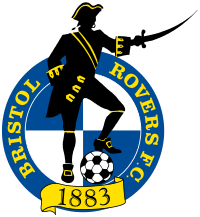 | |||
| Full name | Bristol Rovers F.C | ||
|---|---|---|---|
| Nickname(s) | The Pirates The Gas | ||
| Founded | 1 August 1883 (Black Arabs) | ||
| Ground | Memorial Stadium Horfield, Bristol | ||
| Capacity | 12,296 (3,000 seated)[1] | ||
| President | Wael al-Qadi[2] | ||
| CEO | Martyn Starnes[3] | ||
| Manager | Ben Garner[4] | ||
| League | League One | ||
| 2019–20 | League One, 14th of 23 | ||
| Website | Club website | ||
|
| |||
The club was founded in 1883 as Black Arabs F.C., and were also known as Eastville Rovers and Bristol Eastville Rovers before finally changing its name to Bristol Rovers in 1899. The club's official nickname is "The Pirates", reflecting the maritime history of Bristol. The local nickname of the club is "The Gas", derived from the gasworks next to their former home, Eastville Stadium, which started as a derogatory term used by fans of their main rivals, Bristol City, but was affectionately adopted by the club and its supporters. Cardiff City and Swindon Town are considered their second and third biggest rivals.[5]
Rovers were admitted to the Football League in 1920 and have played there ever since, apart from spending the 2014–15 season in the Conference Premier.[6] Their highest finishing positions were in 1956 and 1959, on both occasions ending the season in 6th place in Division Two, then the second tier of English football. The club's honours include winning the third tier title twice, and the fourth tier play-off final once. Rovers have also been the Football League Trophy finalists twice.
History
Early years
The club was formed following a meeting at the Eastville Restaurant in Bristol in September 1883. It was initially called Black Arabs F.C., after the Arabs rugby team and the predominantly black kits in which they played. This name only lasted for the 1883–84 season, and in a bid to draw more fans from the local area the club was renamed Eastville Rovers in 1884.[7]
Dursley Gazette, 3 December 1883, reproduced in Byrne & Jay (2003).[8] A report of the Black Arabs' first match.
The club played only friendly games until the 1887–88 season, when it took part in the Gloucestershire Cup for the first time. In 1892 the club became a founder member of the Bristol and District League, which three years later was renamed the Western League. In 1897 Eastville Rovers joined the Birmingham and District League, and for two seasons played in both this league and the Western League.[9] At the beginning of the 1897–98 season, the club turned professional and changed its name to Bristol Eastville Rovers,[9] and on 17 February 1899 the name was officially changed to Bristol Rovers.[10] In 1899 Bristol Rovers joined the newly formed Southern League, where they remained until 1920, winning the league title along the way in 1905.[11]
Into the Football League
For the 1920–21 season, the Southern League teams were moved into the new Division Three of the Football League, which became Division Three (South) the following season. They remained in this division for over 30 years, before winning the league, and promotion in the 1952–53 season.[12]
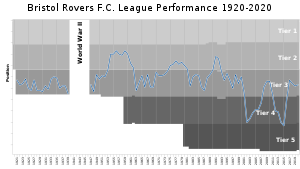
The team has won promotion on five other occasions: in 1973–74 from the Third Division to the Second Division, again in 1989–90 as Division Three champions, in 2006–07 to the Football League One, in 2014–15 to League Two from the Conference Premier, and then in 2015–16 to League One. The club has been relegated six times—in 1961–62, 1980–81, 1992–93, 2000–01, 2010–11 and most recently at the end of the 2013–14 season.[13]
The highest position in the football ladder achieved by Rovers at the end of season is sixth place in the second tier, which they did twice; once in 1955–56, and again in 1958–59.[11] The closest they came to the top flight was in 1955–56, when they ended the season just four points below the promotion positions.[14] The lowest league position achieved by the club is twenty-third out of twenty-four teams in the fourth tier, which has occurred twice. In the 2001–02 season,[11] relegation from the Football League was narrowly avoided on two counts; firstly they ended just one league position above the relegation zone, and secondly the rules were changed the following season to increase the number of relegation places to two, meaning that if Rovers had finished in that position one year later they would have been relegated.[15] This position was matched at the end of the 2013–14 season, which this time saw Rovers relegated to the Conference for the first time.[16] They returned to the league at the end of their first Conference season, with a penalty shootout victory over Grimsby Town in the play-off final.[17] In February 2016 it was announced that a 92% stake in the club had been bought by the Jordanian al-Qadi family and that Wael al-Qadi, a member of the Jordan Football Association, would become the president.[18] The club is now owned by Dwane Sports Ltd with 92.6% of the shares[19] with Bristol Rovers Supporters Club owning the remaining 7.4%.[20] In May 2016 the club recorded a second consecutive promotion in dramatic fashion finishing third in League Two after a 92nd-minute goal secured victory over Dagenham and Redbridge and Accrington Stanley failed to beat Stevenage on the last day of the season.[21] It marked the first time Rovers had reached the third tier of English Football since relegation in 2011. In June 2020 it was announced that president Wael al-Qadi had obtained a 90% stake in Dwane Sports Ltd[22][23] after buying the shares of other members of his family it was also announced that the club's debt would be capitalised and a new training facility would begin construction at Hortham Lane, Almondsbury which is close to the M5 motorway.[24] Rovers have owned the site known as 'The Colony' since 2017[25] but no previous work has been carried out and Rovers have trained on a rented site near Cribbs Causeway.
Cup competitions
.jpg)
The only major cup competition won by Bristol Rovers is the 1972 Watney Cup, when they beat Sheffield United in the final.[26] The club also won the Division Three (South) Cup in 1934–35, as well as winning or sharing the Gloucestershire Cup on 32 occasions. The team has never played in European competition; the closest Rovers came was when they missed out on reaching the international stage of the Anglo-Italian Cup in the 1992–93 season on a coin toss held over the phone with West Ham United.[27]
In the FA Cup, Rovers have reached the quarter-final stage on three occasions. The first time was in 1950–51 when they faced Newcastle United at St James' Park[28] in front of a crowd of 62,787, the record for the highest attendance at any Bristol Rovers match.[29] The second time they reached the quarter final was in 1957–58, when they lost to Fulham,[28] and the most recent appearance at this stage of the competition was during the 2007–08 season, when they faced West Bromwich Albion.[30] They were the first Division Three team to win an FA Cup tie away to a Premier League side, when in 2002 they beat Derby County 3–1 at Pride Park Stadium.[28]
They have twice reached the final of the Football League Trophy, in 1989–90 and 2006–07, but finished runners-up on both occasions. On the second occasion they did not allow a single goal against them in the competition en route to the final, but conceded the lead less than a minute after the final kicked off.[31]
Rivalries
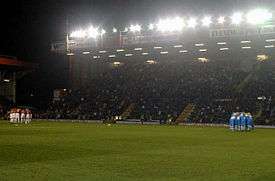
Bristol Rovers main rivals are city neighbours Bristol City, with whom they contest the Bristol derby.[5] This rivalry was deemed 8th fiercest rivalry in English football in an in-depth report by the Football Pools in 2008.[32] The most recent encounter between the clubs took place on 4 September 2013, which saw Rovers beaten by City in a Football League Trophy tie at Ashton Gate Stadium by a 2–1 scoreline. Other rivals are Newport County and mainly teams from the West Country, such as Swindon Town, Cheltenham Town, Yeovil Town and Forest Green Rovers.
In the past, rivalries also emerged with Severnside rivals Cardiff City known as the Severnside derby.[33] Rovers most recent meeting against Cardiff was a League Cup match on 11 August 2016, which Rovers won 1–0 with Chris Lines scoring the winner.[34] The last time Cardiff and Bristol Rovers were in the same league was in the 1999–2000 season.
The first time Rovers encountered Yeovil was a Football League Trophy match which was played on 31 October 2001, which Rovers won via a penalty shoot-out. The most recent encounter between the teams was in a Football League Two match on 15 August 2015, which Rovers won 1–0 with Ellis Harrison scoring a late winner.[35] Because of the close proximity many players have also represented both the clubs, for example Adam Virgo, Gavin Williams, Dominic Blizzard and Tom Parkes.
Rovers last played Swindon Town in the group stage of the EFL Trophy in 2019 (Rovers won 1-0), Cheltenham Town in the first round of the EFL cup in 2019 (Rovers won 3-0) and Forest Green Rovers in the 2015 play-off Semi-final in the Conference (Rovers won 3-0 on aggregate).
Other clubs in the West country such as Plymouth Argyle and Exeter City have also been considered rivals despite being further away from Bristol (162 km for Plymouth and 104 km for Exeter). Bristol Rovers last played Plymouth in the 2nd round replay of the FA cup in 2019 (Rovers won the replay 1-0 after the first round was a 1-1 draw) and last played Exeter in the group stage of the EFL Trophy in 2018 (Exeter won 2-0).
Colours and badge
Bristol Rovers are known for their distinctive blue and white quartered shirts, which they have worn for most of their history. The current home kit consists of a light blue and white quartered shirt and white shorts, while the away kit is black and gold with the same colours as the trim.[36] During the 2008–09 season a special third strip, which is black with a gold sash, and is a reproduction of the original Black Arab shirt, was used for a single match to celebrate the 125th anniversary of the club.[37]
The team began playing in black shirts with a yellow sash from their foundation in 1883 as Black Arabs F.C. until 1885, by which time they were called Eastville Rovers. For the next fourteen years, until 1899, the team wore blue and white hooped shirts. These were replaced by black and white striped shirts until 1919.[38]
When Rovers were admitted to The Football League in 1920 they wore white shirts with blue shorts. These remained the team colours until 1930, when the colours were reversed to blue shirts and white shorts for one season.[38] The blue and white quarters were first worn in 1931, when they were introduced to try to make the players look larger and more intimidating.[39] Rovers continued to wear the quarters for 31 years until they were replaced by blue pinstripes on a white background.
Over the next ten years, Rovers went on to wear blue and white stripes, all blue, and blue shirts with white shorts before returning to the blue and white quarters in 1973, which have remained the colours ever since.[38] During the 1996–97 season, Rovers wore an unpopular striped quartered design, prompting fans to refer to it as the Tesco bag shirts[40] because of their similarity to the design used for the company's carrier bags. The change in design prompted the Trumpton Times fanzine to change its name to Wot, No Quarters?[41]
The black and gold shirts were also used as the away kit for the 2002–03 season, the club's 120th anniversary.
In 2005, Rovers ran an April Fools' joke on their official website, stating that the team's new away strip would be all pink. Although this was intended to be a joke, a number of fans petitioned the club to get the kit made for real, and also suggested that funds raised through the sale of the pink shirts should be donated to a breast cancer charity.[42] Although the pink shirts were never used in a competitive fixture, they were worn for a pre-season friendly against Plymouth Argyle in 2006.[43]
A pirate features on both the club badge and the badge of the supporters club,[44] reflecting the club nickname of The Pirates. Previous club badges have featured a blue and white quartered design, based on the quartered design of the team's jerseys.
Kit suppliers and sponsors
Rovers first used Bukta as an official kit supplier in 1977, and Great Mills as the first kit sponsor followed 1981. Rovers' longest running kit supplier is Errea who supplied the club kits for eleven years (2005–16).[45][46] The club's longest running kit sponsorship was from local company Cowlin Construction who sponsored the club for a total of 11 years before ending the deal in 2009.[47] Following the end of the Cowlin deal, sponsors were chosen by raffle, via the 1883 Club.[48] This process lasted nine seasons before the club announced Football INDEX as new sponsors for both home and away kits.[49] In 2019 Utilita become the main shirt sponsors of both the home and away kits for the 2019-2020 season,[50] the deal was then extended in July 2020 to cover the 2020-2021 season[51] marking the first time a shirt sponsor had lasted for more than one season since the end of the Cowlin sponsorship in 2009.
| Period | Kit Supplier | Home Kit Sponsor | Away Kit Sponsor |
|---|---|---|---|
| 1977–1981 | Bukta | No sponsor | |
| 1981–1983 | Great Mills | ||
| 1983–1984 | Toshiba | ||
| 1984–1986 | Hobott | ||
| 1986–1987 | Henson | Peter Carol | |
| 1987–1988 | Design Windows | ||
| 1988–1990 | Spall | Design Windows | Universal Components |
| 1990–1992 | Design Windows | ||
| 1992–1993 | Roman Glass | ||
| 1993–1995 | Matchwinner | ||
| 1995–1996 | Le Coq Sportif | Elite Hampers | |
| 1996–1997 | Cica | Bradshaw's Snack Box | |
| 1997–1998 | The Jelf Group | ||
| 1998–1999 | Cowlin Construction | ||
| 1999–2001 | Avec | ||
| 2001–2005 | Strikeforce | ||
| 2005–2009 | Errea | ||
| 2009–2010 | N-Gaged | Stevens, Hewlett & Perkins | |
| 2010–2011 | Smart Computers | Stalbridge Linen | |
| 2011–2012 | McCarthy Waste | ITS | |
| 2012–2013 | Opus Recruitment Solutions | CR Windows | |
| 2013–2014 | Eurocams | Highspec Travel Services | |
| 2014–2015 | Arco | Office Beverages | |
| 2015–2016 | The Sportsman Pub | Pensord Press | |
| 2016–2017 | Macron | Dribuild | Powersystems UK Ltd |
| 2017–2018 | Thorntons Travel | Barrs Court Construction | |
| 2018–2019 | Football INDEX | ||
| 2019–Present | Utilita | ||
Stadium
Grounds
- Purdown – 1883–1884
- Three Acres – 1884–1891
- Schoolmasters Cricket Ground – 1891–1892
- Durdham Down – 1892–1894
- Ridgeway – 1894–1897
- Eastville Stadium – 1897–1986
- Twerton Park – 1986–1996
- The Memorial Stadium – 1996–present
History
Rovers play their home games at the Memorial Stadium in Horfield, a ground they formerly shared with Bristol Rugby. The team moved to The Mem, as it is known informally, at the beginning of the 1996–97 season, initially as tenants but purchased it two years later.[52]
When Bristol Rovers were known as Black Arabs F.C. in 1883, they played their home games at Purdown, Stapleton. The following year they moved to Three Acres, the precise location of which is not known, but is believed to have been in the Ashley Down area of Bristol, where they remained for seven years. This was followed by brief stays at the Schoolmasters Cricket Ground, Durdham Down and Ridgeway.
For the majority of their history, Bristol Rovers have played their home games at the Eastville Stadium, where they remained for a period of 89 years from 1897 to 1986. Financial problems led to the team being forced to leave Eastville, and they found a temporary home at Twerton Park, the home of Bath City. They stayed in Bath for 10 seasons, before returning to Bristol in 1996.
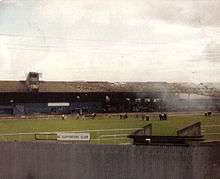
Rovers also played five home games at Ashton Gate Stadium, home of rivals Bristol City, following a fire which destroyed the South Stand of the Eastville Stadium on the night of the 16–17 August 1980. Rovers returned to Eastville in October 1980. During World War II, some friendly matches were played in Kingswood, and in their early history some games were played at Parson Street, Bedminster[7]
In January 2007 planning permission was granted for a new 18,500 capacity all-seater stadium to be built on the site of the Memorial Stadium.[53] The project was abandoned after a series of delays.[54][55][56] In June 2011, the club announced its intention to relocate the club to a new 21,700 all-seater stadium on the University of the West of England's Frenchay campus.[57] The planned UWE Stadium was shelved in August 2017 due to disputes between the club and the university, and attention returned to redeveloping the Memorial Stadium.[58]
In 2018 there was a crowd recording for the 2018 Aardman film Early Man at the Memorial Stadium.[59]
In June 2020 the club began construction of a new training facility at a site on Hortham Lane, Almondsbury near the M5 motorway.[24] The site is set to include two full size pitches, a goalkeeping area, a gym and a clubhouse building.[24] Rovers have owned the site since 2017[25] but no work had previously been carried out.
There is currently speculation around Bristol Rovers purchasing the Bristol Fruit Market as a site for a new stadium.
Supporter culture
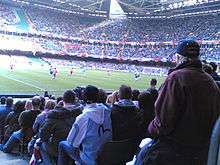
The team traditionally draws the majority of its support from north and east Bristol[60] and South Gloucestershire. Many towns and villages in the surrounding area are also home to significant pockets of Rovers supporters.[38]
The nickname given to Bristol Rovers supporters is "Gasheads".[61] "The Gas" was originally coined as a derogatory term by the supporters of Bristol Rovers' rivals Bristol City, and was in reference to the large gas works adjacent to the old Bristol Rovers stadium, in Eastville, Bristol which wafted the sometimes overpowering odour of town gas across the crowd.[38] "Gasheads" was adopted as a name by a splinter group of Rovers supporters in the mid-1980s to early 1990s. The chant "Proud to be a Gashead" spread to regular fans, and a fanzine was produced called The Gashead.
The term "Gasheads" is now universally accepted within the English media and football fraternity as referring to Bristol Rovers supporters.[62] After the club's relegation to Football League Two in 2001, the club designated the squad number 12 to the Gasheads to signify them as the club's 12th Man in recognition of their loyal support.[61]
The retired Conservative MP for Hayes and Harlington Terry Dicks is a Bristol Rovers fan. He mentioned the club in parliament on 5 May 1994 when debating with Labour MP and Chelsea fan Tony Banks.[63] Other notable fans are local musicians Roni Size[64] and Geoff Barrow of Portishead[65] and writer David Goldblatt.[66]
Based on Sept. 2014 statistics released by the Home Office,[67] the Rovers fan base were named the Most Dangerous English Football fan base for the 2013-2014 season, with 57 arrests on the season, of which 35% were for "violent disorder." Particularly dangerous was the scene on May 3, 2013 when the Rovers were assured relegation from the Football League for the first time.[68]
The Rovers fans have good relations with Spanish club CE Sabadell FC, which initially began due to several Rovers fans noticing that the club had the same colours.[69] In July 2016 the two clubs played each other in a pre-season match in Spain.[70]
One Bristol Rovers print fanzine is currently active and is entitled Last Saturday Night.[71] There is also a fan-run podcast and blog called GasCast.[72]
Club song
The song which is synonymous with Rovers is "Goodnight, Irene", which was written by Lead Belly.[73]
Opinions differ as to how this came about but it is thought to have become popular in the 1950s when a version of the song was in the British charts—the line "sometimes I have a great notion to jump in the river and drown"—seemed to be particularly apt when Rovers lost as the Bristol Frome flows alongside the old Eastville ground. It is believed that John Clapham is responsible for the song as he used to work at Eastville stadium for the greyhound racing and the last record he would play at the end of the night was "Goodnight Irene" also having a daughter called Irene, the record would then be left in the player and was played at the football.[38] Another theory is that it was sung at a fireworks display at the Stadium the night before a home game against Plymouth Argyle in the 1950s. During the game the following day, Rovers were winning quite comfortably and the few Argyle supporters present began to leave early prompting a chorus of "Goodnight Argyle" from the Rovers supporters—the tune stuck and Irene became the club song.[74]
Another popular Bristol Rovers song is "Tote End Boys", which was written and sung by Ben Gunstone. The name derives from the section of Gasheads who stood in the Tote End terrace at Rovers' old home, Eastville Stadium.
Players
- As of 8 August 2020[75]
Current squad
Note: Flags indicate national team as defined under FIFA eligibility rules. Players may hold more than one non-FIFA nationality.
|
|
Development squad
Note: Flags indicate national team as defined under FIFA eligibility rules. Players may hold more than one non-FIFA nationality.
|
|
Notable former players
This is a list of the most noted former players at Bristol Rovers Football Club, stating the period that each player spent at the club, their nationality and their reason for being listed. To be included in this list a player must have made over 400 league appearances for the club, scored over 100 league goals or hold a club record.
- Note: all details from Byrne & Jay (2003) unless otherwise stated.
| Years | Nation | Player | Achievement | Notes |
|---|---|---|---|---|
| 1927–1947 | Jack Pitt | Played 467 league games. Spent over 50 years at the club as a player, coach and groundsman. | [76] | |
| 1928–1932 | Ronnie Dix | The club's youngest ever player, at 15 years 173 days. The Football League's youngest ever goalscorer, at 15 years 180 days. | [77] | |
| 1936–1956 | Ray Warren | Played 450 league games. | ||
| 1945–1955 | Vic Lambden | Scored 117 goals in 268 league appearances. | ||
| 1945–1962 | George Petherbridge | Played 457 league games. | ||
| 1946–1958 | Harry Bamford | Played 486 league games. | ||
| 1949–1964 | Geoff Bradford | Rovers' record goal scorer with 242 league goals from 462 appearances. The only player to be capped by England while at Bristol Rovers. | ||
| 1953–1962 | Peter Hooper | Scored 101 goals in 297 league games. | ||
| 1953–1968 | Alfie Biggs | Played 424 league games and scored 178 goals. | ||
| 1956–1973 | Bobby Jones | Played 421 league games and scored 101 goals. | ||
| 1959–1973 | Harold Jarman | Played 452 league games and scored 127 goals. | ||
| 1966–1980 | Stuart Taylor | Played 546 league games, more than any other Rovers player | ||
| 1981–1999 | Ian Holloway | Named the fans' Cult Hero in a BBC poll. | [78] | |
| 1987–1989 | Nigel Martyn | Became the first goalkeeper to command a million pound transfer fee when he was sold to Crystal Palace. | [79] | |
| 1992–2000 | Andy Tillson | Record signing, and former club captain. | [80] | |
| 1997–1999 | Barry Hayles | Club record sale when he moved to Fulham for £2,100,000. | ||
| 2000–2003 | Vitālijs Astafjevs | Most internationally capped Bristol Rovers player, with 31 appearances for Latvia while playing with Rovers 158 times. | [80] | |
| 2006-2009 | England | Ricky Lambert | Fan favourite who scored 51 times for the club across 3 seasons. | |
| 2016–2018 | Byron Moore | Scorer of Rovers' fastest ever league goal | [81] |
Club staff
The current manager of Bristol Rovers is Ben Garner who was appointed in December 2019 succeeding Graham Coughlan.[4]
Club personnel
|
Board of directors
| Position | Name[19] |
|---|---|
| President | Wael al-Qadi |
| CEO | Martyn Starnes |
| Director | Tom Gorringe |
| Director | Karim Mardam-Bey |
|}
Managerial history
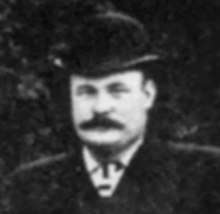
As of March 2014, 32 men have been appointed as a manager of Bristol Rovers Football Club, excluding caretaker managers.[82][83] Bobby Gould, Gerry Francis and John Ward are the only men to have been given the job on a permanent basis twice, although Garry Thompson had a separate spell as caretaker manager before later being appointed permanently, and Phil Bater was caretaker manager on two separate occasions.
|
|
Youth Academy
The Bristol Rovers Academy currently operates at The City Academy Bristol and Sir Bernard Lovell School. Current first-team squad members Alfie Kilgour and Michael Kelly both graduated from the Academy to earn professional contracts. Perhaps the most successful former member of the academy is Scott Sinclair, who was signed by Chelsea in 2005 for an initial fee of £200,000, with further payments to the club possible, depending on performance.[84] He currently plays for Scottish Premier League club Celtic F.C. Other former Academy players currently contracted to teams in the Premier League or English Football League include Ryan Broom (Cheltenham Town), Ellis Harrison (Portsmouth), Chris Lines (Northampton Town), Tom Lockyer (Charlton Athletic), Matt Macey (Arsenal), Tyrone Mings (Aston Villa) and Ollie Clarke (Mansfield Town).
Women's team
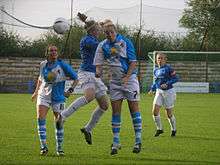
The club had a successful women's team, formed in 1998 as Bristol Rovers W.F.C. following a merger with Cable-Tel L.F.C.. This merger came about as Bristol Rovers only had girls teams up to the under 16 age group level, so when girls reached the age of 16 they were forced to leave the club. The merger with Cable-Tel meant that Bristol Rovers had a senior squad. The club's name was changed to Bristol Academy W.F.C. in 2005 to reflect the increased investment from the Bristol Academy of Sport. In 2016, Bristol Academy were re-branded as Bristol City following a sponsorship arrangement with Rovers' local rivals.[85]
In 2019 it was announced that Rovers are to reform their women's team. They will field two teams in the Gloucestershire County Womens Football League starting from the 2019–20 season. The first team will play in Division One with a development team playing in Division Two.[86][87]
Honours
Bristol Rovers F.C. have won the following honours:[88]
Leagues
- Southern League Division One: Champions: 1
- 1904–05
- Football League Third Division South: Champions: 1
- 1952–53
- Football League Third Division: Champions: 1
- 1989–90
- Football League Two play-offs: Winners: 1
- Conference Premier play-offs: Winners: 1
Cups
- Football League Third Division South Cup: Winners: 1
- 1934–35
- Football League Trophy: Runners-up : 2
- 1989–90, 2006–07
- Watney Cup: Winners : 1
- 1972
- Gloucestershire Cup: Winners: 32
- 1888–89, 1902–03, 1904–05, 1913–14, 1924–25, 1927–28, 1934–35, 1935–36, 1937–38, 1947–48, 1948–49, 1950–51, 1953–54, 1954–55, 1955–56, 1958–59, 1962–63, 1963–64, 1964–65, 1965–66, 1967–68, 1973–74, 1974–75, 1981–82, 1982–83, 1983–84, 1984–85, 1988–89, 1989–90, 1992–93, 1993–94, 1994–95
Records
Scorelines
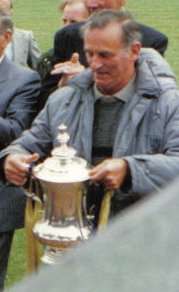
- Biggest League Win:[89]
- 7–0 (v Brighton & Hove Albion, Division Three (South), 29 November 1952)
- 7–0 (v Swansea City, Division Two, 2 October 1954)
- 7–0 (v Shrewsbury Town, Division Three, 21 March 1964)
- 7–0 (v Alfreton Town, Conference Premier, 25 April 2015)
- Biggest Cup Win:
- Competition proper: 6–0 (v Merthyr Tydfil, FA Cup Round 1, 14 November 1987)[89]
- Qualifying: 15–1 (v Weymouth, FA Cup Third Qualifying Round, 17 November 1900)[89]
- Biggest League Defeat: 0–12 (v Luton Town, Division Three South, 13 April 1936)[90]
Players
- Most League Appearances: 546 – Stuart Taylor, 1966–1980[91]
- Most Goals for club: 242 – Geoff Bradford, 1949–1964[91]
- Most Goals in a season: 33 – Geoff Bradford, 1952–53[91]
- Highest Transfer Fee Paid: £375,000 – Andy Tillson from Queens Park Rangers, November 1992[91]
- Highest Transfer Fee Received: £2,600,000 – Barry Hayles to Fulham, November 1998
Other
- Record Home Attendance: 38,472 (v Preston North End, FA Cup, 30 January 1960[92]
References
- "Bristol Rovers". Official website.
- "Bristol Rovers: Chairman Steve Hamer defends club's progress on stadium". BBC. Retrieved 27 August 2018.
- "CEO Martyn Starnes Commences Role with the Club". Bristol Rovers. Retrieved 21 November 2019.
- "Ben Garner: Bristol Rovers name ex-West Brom and Crystal Palace coach as manager". Retrieved 23 December 2019.
- "Club rivalries uncovered" (PDF). Football Fans Census. Archived from the original (PDF) on 20 October 2013. Retrieved 23 October 2008.
- "Bristol Rovers Join Torquay United in Relegation". 3 May 2014. Retrieved 3 May 2014.
- Byrne, Stephen; Jay, Mike (2003). Bristol Rovers Football Club – The Definitive History 1883–2003. Stroud: Tempus. ISBN 0-7524-2717-2.
- Byrne & Jay (2003), p29
- "Into the league". bristolrovers.co.uk. 6 August 2007. Archived from the original on 16 September 2008. Retrieved 26 October 2008.
- Byrne & Jay (2003), p52
- "Bristol Rovers". Football Club History Database. Archived from the original on 20 April 2010. Retrieved 19 March 2012.
- Byrne & Jay (2003), p229
- "Wanderers send the Gas down". Chairboys on the Net. 2 May 2001. Archived from the original on 8 October 2006. Retrieved 24 October 2008.
- Byrne & Jay (2003), p242
- "Promotion to/Relegation from the Football League". The Pyramid.info. 9 January 2005. Retrieved 28 October 2008.
- "League Two: Bristol Rovers relegated after Wycombe and Northampton win". The Guardian. 3 May 2014. Retrieved 29 May 2014.
- Mitchell, Brendon (17 May 2015). "Bristol Rovers 1–1 Grimsby". BBC Sport. Retrieved 17 May 2015.
- "Bristol Rovers: Al-Qadi family complete takeover of League Two club". BBC. Retrieved 20 February 2016.
- "Bristol Rovers FC Club Contacts". Bristol Rovers Football Club. Retrieved 3 March 2016.
- Geoff Twentyman (presenter) & Steve Hamer (guest) (19 February 2016). Friday Night Sport (Radio broadcast). Bristol: BBC Radio Bristol. Retrieved 22 February 2016.
- "Bristol Rovers won promotion to League One in dramatic fashion". BBC Sport.
- "Club President's Open Letter to Fans..." www.bristolrovers.co.uk. Retrieved 14 July 2020.
- "Club Statement: Ownership and Board Structure". www.bristolrovers.co.uk. Retrieved 14 July 2020.
- "Work To Begin at Training Ground Site Next Week". www.bristolrovers.co.uk. Retrieved 14 July 2020.
- "THE COLONY TRAINING GROUND". www.bristolrovers.co.uk. Retrieved 14 July 2020.
- Greg Struthers (24 February 2008). "Caught in time: Bristol Rovers win the Watney Cup, 1972". The Times. London. Retrieved 27 October 2008.
- "Anglo-Italian Cup 1992–93". Football Club History Database. Retrieved 26 October 2008.
- "Up for the Cup". bristolrovers.co.uk. 1 August 2007. Archived from the original on 16 September 2008. Retrieved 25 October 2008.
- Byrne & Jay (2003), p221
- "FA Cup quarter-final draw". BBC Sport. 27 February 2008. Retrieved 29 October 2008.
- "Bristol Rovers 2–3 Doncaster AET". BBC Sport. 1 April 2007. Retrieved 25 October 2008.
- "Football Rivalries Report 2008". The Football Pools. Archived from the original on 5 March 2008. Retrieved 27 February 2013.
- O'Brien, Chris (9 December 2004). "Bluebird to the Bone – Football Rivalries: The Complete Results". sportnetwork. Retrieved 27 February 2013.
- "Bristol Rovers 1–0 Cardiff City". BBC Sport. 11 August 2016. Retrieved 1 February 2017.
- "Yeovil Town vs Bristol Rovers results in Johnstone's Paint Trophy". ESPN. Retrieved 27 February 2013.
- "The look of Rovers in 2008/09". bristolrovers.co.uk. Bristol Rovers Football Club. 2 June 2008. Archived from the original on 29 August 2008. Retrieved 6 November 2008.
- "Rovers full of eastern promise". The Football League. 23 October 2008. Archived from the original on 10 February 2009. Retrieved 19 March 2012.
- "Bristol Rovers Frequently Asked Questions". Archived from the original on 22 August 2007.
- Byrne & Jay (2003), p161
- "Bristol Rovers – Historical Kits". Historical Football Kits. Retrieved 9 May 2007.
- "About us". Black Arab fanzine. Archived from the original on 28 September 2007. Retrieved 13 February 2007.
- "Bristol Rovers fans are pretty in pink". BBC Bristol. 19 April 2005. Retrieved 14 May 2007.
- "Walker strike sinks Pilgrims". bristolrovers.co.uk. Bristol Rovers Football Club. 29 July 2006. Archived from the original on 8 February 2009. Retrieved 14 May 2007.
- "Bristol Rovers Supporters Club logo". bristolroverssc.co.uk. Bristol Rovers Supporters Club. Archived from the original on 16 June 2007. Retrieved 30 April 2007.
- "Bristol Rovers". Historical Football Kits. Retrieved 15 September 2017.
- "Bristol Rovers join forces with Macron". Bristol Rovers F.C. 28 June 2016. Retrieved 15 September 2017.
- "No More Cowlin For Rovers". Vital Football. 5 March 2009. Retrieved 15 September 2017.
- "Bristol Rovers fan scoops sponsorship double". South West Business. 22 April 2013. Retrieved 15 September 2017.
- "New Front of Shirt Sponsor Announced". Bristol Rovers F.C. 20 July 2018.
- "Utilita Energy Announced as Front of Shirt Sponsor". www.bristolrovers.co.uk. Retrieved 14 July 2020.
- "Utilita Partnership Extended". www.bristolrovers.co.uk. Retrieved 14 July 2020.
- "Back to Bristol". bristolrovers.co.uk. Bristol Rovers Football Club. 2 August 2007. Archived from the original on 16 May 2008. Retrieved 6 November 2008.
- "Memorial Stadium given go-ahead". BBC News. 18 January 2007. Retrieved 6 November 2008.
- "Football and rugby stay in city". BBC News. 17 August 2007. Retrieved 6 November 2008.
- "Memorial Stadium plans hit hurdle". BBC News. 30 May 2008. Retrieved 1 June 2008.
- "Stadium regeneration delayed". bristolrovers.co.uk. Bristol Rovers Football Club. 3 June 2008. Archived from the original on 22 November 2008. Retrieved 23 November 2008.
- "ROVERS ANNOUNCE NEW STADIUM PLANS". bristolrovers.co.uk. 9 June 2011. Archived from the original on 11 June 2011. Retrieved 9 June 2011.
- McCormick, Ken (2 August 2017). "Bristol Rovers abandon UWE stadium plan after club is unable to agree terms with university". Bristol Post. Retrieved 15 September 2017.
- https://www.aardman.com/take-part-in-a-crowd-record-for-aardmans-latest-movie/
- "Bristol City vs. Bristol Rovers". Football Derbies.com. Archived from the original on 17 December 2010. Retrieved 9 May 2007.
- "First Team – Gasheads". Bristol Rovers F.C. Archived from the original on 20 July 2008. Retrieved 25 October 2008.
- Brown, Oliver (7 January 2008). "Craig Hinton puts Bristol Rovers on a high". The Daily Telegraph. London. Retrieved 24 April 2008.
- HC Deb, 5 May 1994 vol 242 cc851–925
- "9 classic Bristol underground tunes selected by Roni Size". Red Bull. Retrieved 6 July 2018.
- "Geoff Barrow on Twitter". Retrieved 6 July 2018 – via Twitter.
- https://www.youtube.com/watch?v=QqHX_qR9Fug
- https://assets.publishing.service.gov.uk/government/uploads/system/uploads/attachment_data/file/352864/FootballRelatedArrestsBanningOrderSeason201314.pdf
- https://bleacherreport.com/articles/2223414-5-most-dangerous-fanbases-in-english-football-during-the-2013-2014-season
- Yong, Michael (23 April 2015). "Barcelona fans from FC Sabadell [sic] to cheer on Bristol Rovers in home game against Alfreton Town". Bristol Post. Archived from the original on 17 December 2015. Retrieved 10 April 2016.
- "ROVERS PRE-SEASON TOUR TO SABADELL". Bristol Rovers F.C. 5 January 2016. Retrieved 10 April 2016.
- https://twitter.com/LSNZine%5B%5D
- "Archived copy". Archived from the original on 22 June 2019. Retrieved 7 July 2020.CS1 maint: archived copy as title (link)
- "Goodnight, Irene". Harry Lewman Music. Archived from the original on 13 June 2007. Retrieved 30 April 2007.
- Byrne & Jay (2003), p225
- "Bristol Rovers Squad". Sky Sports. Retrieved 27 August 2018.
- "The PFA pays tribute to Bristol Rovers legend Jack Pitt who sadly passed away last week, aged 84". givemefootball.com. Professional Footballers' Association. 1 January 2007. Archived from the original on 13 June 2011. Retrieved 19 March 2012.
- Kempson, Russell (2 October 2008). "Barnsley's bright young thing Reuben Noble-Lazarus back at school". The Times. London. Retrieved 3 November 2008.
- "Bristol Rovers' cult heroes". BBC Sport. 18 March 2005. Retrieved 3 November 2008.
- Byrne & Jay (2003), p391
- "Bristol Rovers all time records". Soccerbase. Archived from the original on 7 February 2009. Retrieved 6 November 2008.
- "AFC Wimbledeon 0 1 Bristol Rovers". BBC Sport. 8 April 2017. Retrieved 7 February 2018.
- Byrne & Jay (2003), pp.479–484
- "Bristol Rovers manager history". Soccerbase. Archived from the original on 13 June 2007. Retrieved 3 November 2008.
- "Chelsea compensation figures confirmed". The Football League. 9 November 2005. Archived from the original on 19 September 2012. Retrieved 20 August 2009.
- "Bristol Academy to rebrand as Bristol City Women's FC". BBC Sport. 20 November 2015.
- "Bristol Rovers Community Trust Launch 'The Return of the Gas Girls'". Bristol Rovers. 30 April 2019. Retrieved 30 April 2019.
- "Bristol Rovers Community Trust Launch New Gas Girls Promotional Branding". Bristol Rovers. 5 June 2019. Retrieved 5 June 2019.
- "Dates & Honours". Bristol Rovers F.C. Archived from the original on 22 July 2012. Retrieved 20 August 2009.
- "Dates & honours". Archived 23 November 2008 at the Wayback Machine |date=6 August 2007 |publisher=bristolrovers.co.uk |accessdate=9 February 2007 |url-status=dead |archiveurl=https://web.archive.org/web/20120722061128/http://www.bristolrovers.co.uk/page/DatesAndHonours/0%2C%2C10328%2C00.html |archivedate=22 July 2012}≈}
- "Bristol Rovers Football Club Information". Sporting Chronicle. Archived from the original on 16 December 2006. Retrieved 9 February 2007.
- Rollin, Glenda; Rollin, Jack, eds. (2006). Sky Sports Football Yearbook 2006–2007. London: Headline. p. 115. ISBN 0-7553-1526-X.
- Byrne & Jay (2003), p476
Sources
- Byrne, Stephen; Jay, Mike (2003). Bristol Rovers Football Club – The Definitive History 1883–2003. Stroud: Tempus. ISBN 0-7524-2717-2.